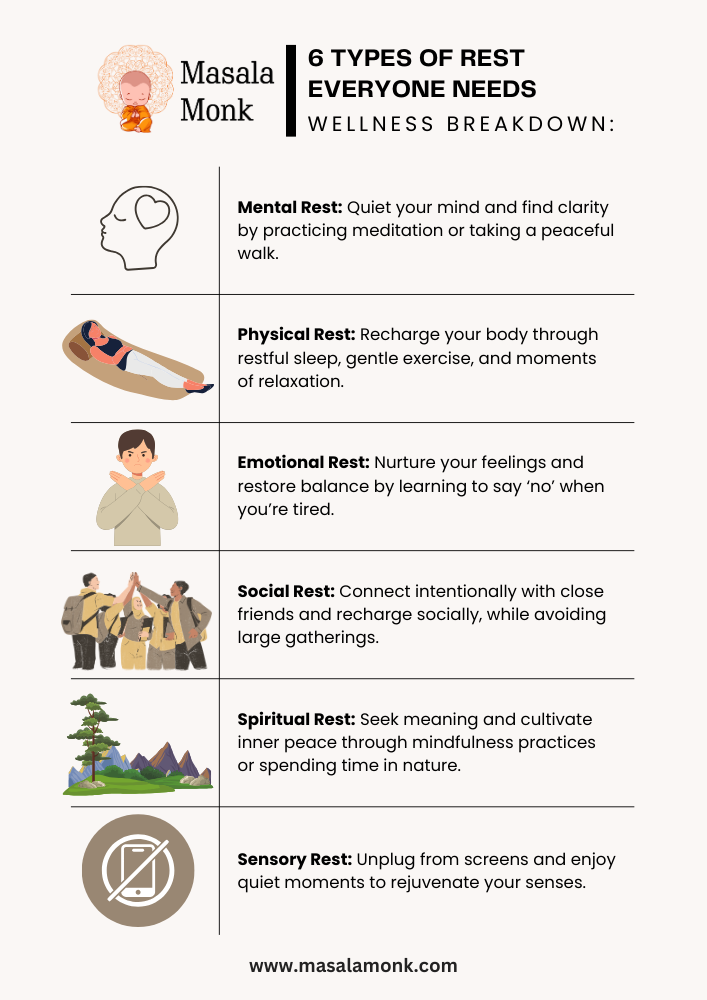
In today’s fast-paced world where we work like a robot rest is often undervalued. However, understanding the different types of rest and incorporating them into our daily routines is essential for maintaining overall well-being. Let’s explore the six types of rest that everyone needs to lead a balanced and healthy life.
1. Mental Rest:
Mental rest involves giving your brain a break from continuous thinking and cognitive activities. It’s about pausing the constant stream of thoughts, plans, and worries that often clutter our minds.
How to achieve mental rest:
Meditation: Spend a few minutes each day meditating. This can help clear your mind and reduce stress.
Quiet Walk: Take a leisurely walk in a quiet place, away from the hustle and bustle of daily life. This can help you reset and recharge mentally.
2. Physical Rest:
Physical rest is about allowing your body to recover and rejuvenate. It’s essential for maintaining physical health and energy levels.
How to achieve physical rest:
Sleep: Ensure you get enough sleep each night. Quality sleep is crucial for physical recovery.
Stretching and Gentle Exercise: Incorporate light stretching or gentle exercises like yoga into your routine to relax your muscles.
Relaxation: Take time to relax, whether it’s lounging in a comfortable chair, taking a warm bath, or simply lying down and resting.
3. Emotional Rest:
Emotional rest is about being true to your feelings and allowing yourself to express them. It’s important to recognize and address your emotions rather than suppressing them.
How to achieve emotional rest:
Be Honest: Be honest with yourself and others about how you feel. Don’t hide your emotions.
Say NO: Learn to say no when you’re tired or overwhelmed. It’s okay to prioritize your emotional well-being.
4. Social Rest:
Social rest involves finding a balance between social interactions and solitude. It’s important to recharge alone or with close friends who uplift and support you.
How to achieve social rest:
Alone Time: Spend time alone to recharge and reflect.
Close Friends: Engage with close friends who make you feel comfortable and happy. Avoid large gatherings if they drain your energy.
5. Spiritual Rest
Spiritual rest is about finding meaning and purpose in life. It involves connecting with something greater than yourself, whether it’s through religion, spirituality, or nature.
How to achieve spiritual rest:
Mindfulness: Practice mindfulness or meditation to connect with your inner self.
Nature: Spend time in nature, appreciating its beauty and tranquility. This can help you feel more grounded and connected.
6. Sensory Rest
Sensory rest is about reducing sensory overload and giving your senses a break. This is particularly important in our digital age, where screens and constant notifications can overwhelm our senses.
How to achieve sensory rest:
Unplug: Take regular breaks from screens, including phones, computers, and TVs.
Quiet Time: Spend some time in a quiet environment, free from loud noises and distractions.
Conclusion
Incorporating these six types of rest into your life can significantly improve your overall well-being. It’s about recognizing the different ways our bodies and minds need to rest and taking proactive steps to fulfill those needs. By doing so, you can lead a more balanced, healthy, and fulfilling life.
Call to Action
Try integrating these types of rest into your daily routine and notice the positive changes they bring. Share your experiences and feedback in the comments below. Which type of rest do you find most challenging to incorporate, and why? Let’s support each other in our journey towards better rest and overall well-being.










